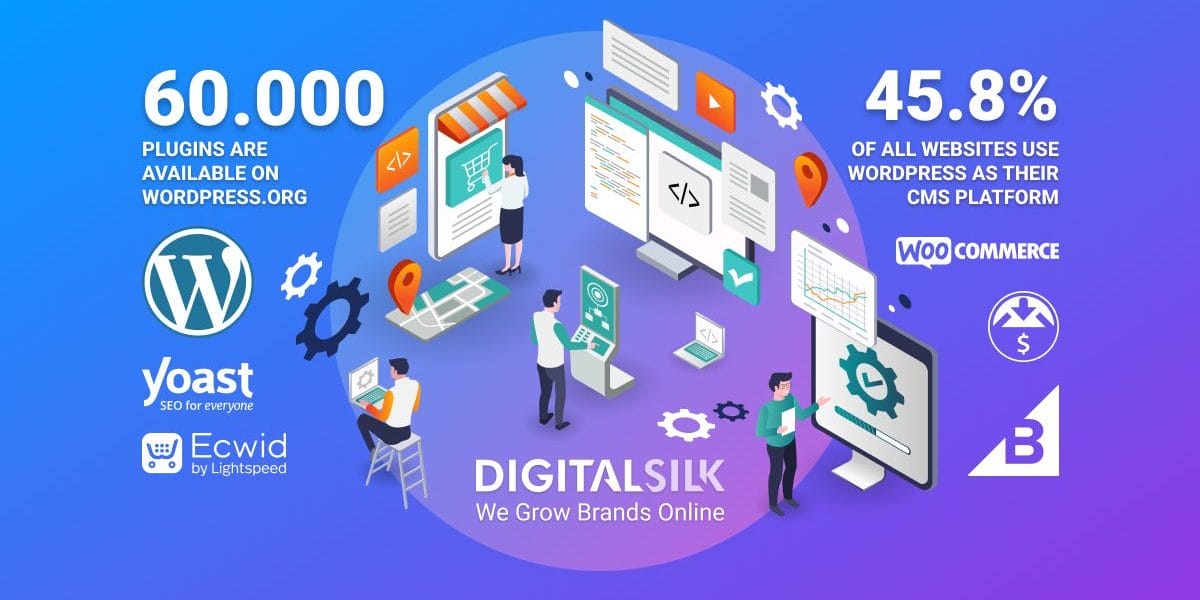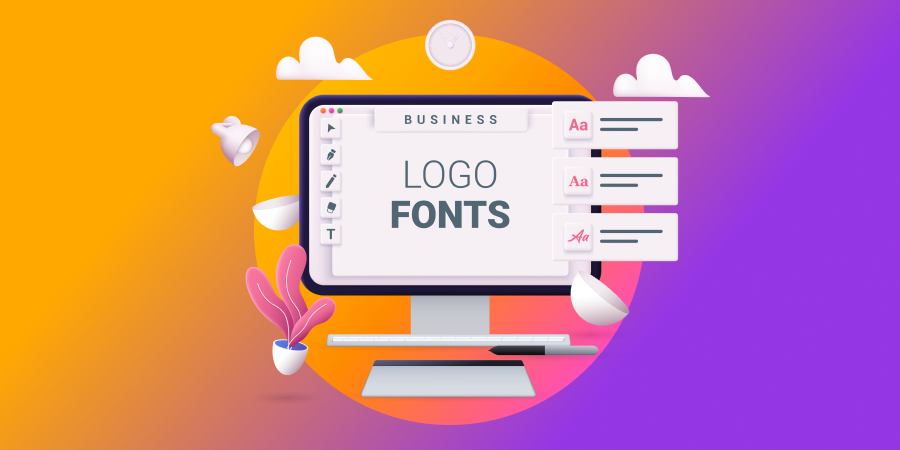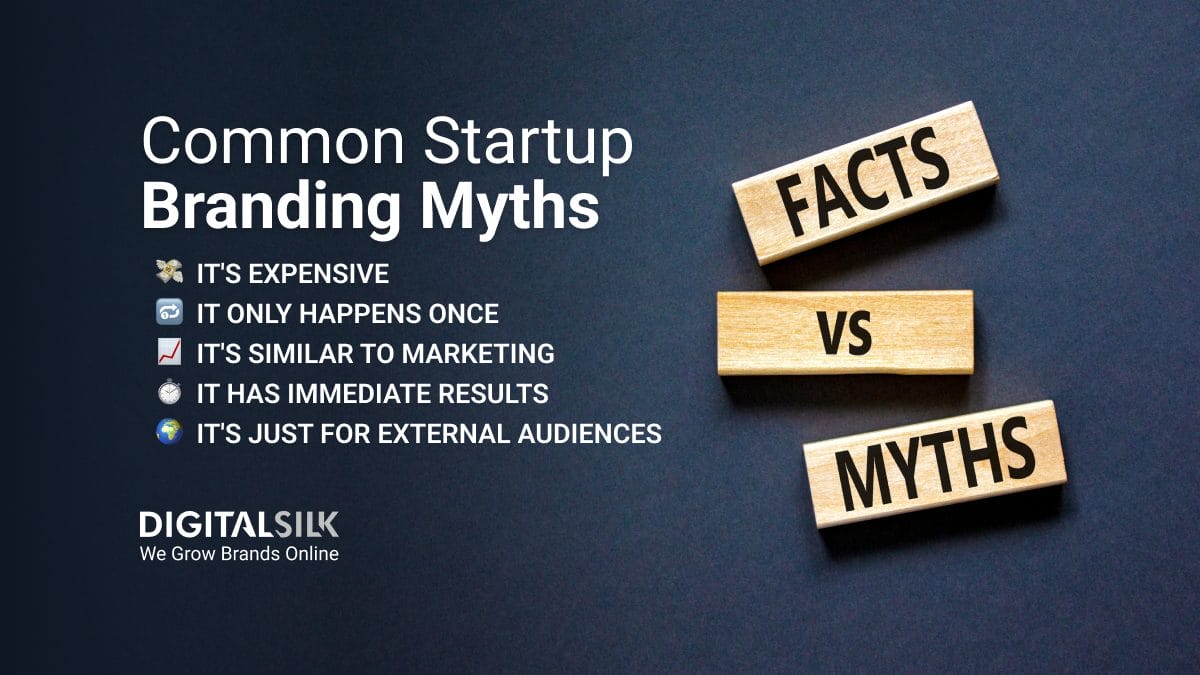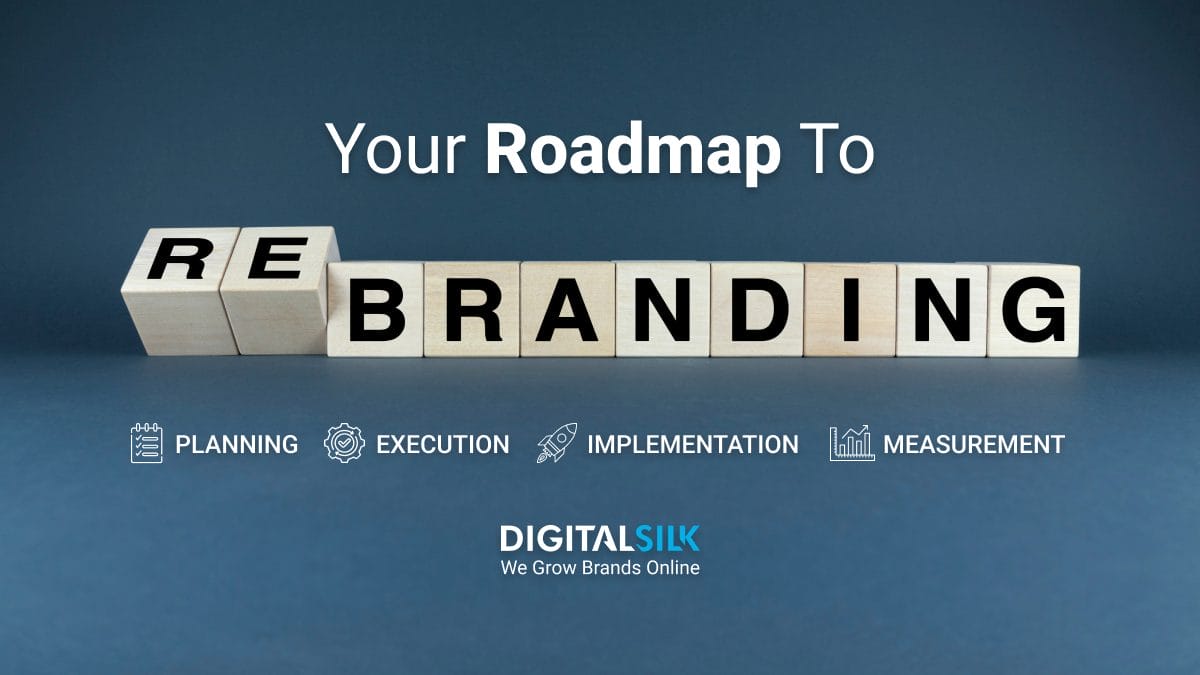45.8% of all websites use WordPress as their CMS platform.
Its appeal lies in its easy-to-use admin panel and customization options.
You can scale and tailor your eCommerce store to accommodate business growth and changing consumer trends without needing extensive technical knowledge or coding experience. Simply install the relevant plugins and let them do the heavy lifting.
Below, we’ll explore some useful WordPress eCommerce plugins to help you optimize and enhance your online store.
10 Best WordPress eCommerce Plugins
With over 60.000 available options, you can easily find a suitable match to grow your eCommerce business.
We selected 10 WordPress eCommerce plugins that can help you streamline your checkout process, optimize product showcases and improve your site’s performance.
The following plugins are safe, reliable and easy to use, and can help you create an enjoyable shopping experience for your customers.
1. WooCommerce
Capterra Rating: 4.5/5
Best for: Highly customizable and scalable eCommerce stores

WooCommerce is easily the cream of the crop in terms of plugins. Its appeal lies in its versatility and flexibility — it can turn any WordPress site into a fully functioning eCommerce store.
It’s packed with rich features and is optimized to handle a large number of SKUs (Stock Keeping Units), customer accounts and transactions.
With over 5.4 million online stores globally, WooCommerce offers advanced product variation and management features, custom shipping options and tax calculations and insightful reporting and analytics.
Not to mention its recent acquisition by Automattic — the organization behind the WordPress platform itself — which gives users access to a global network of experienced developers and industry experts to ensure optimal security and performance.
2. Easy Digital Downloads
Capterra Rating: 4.6/5
Best for: Digital products and services
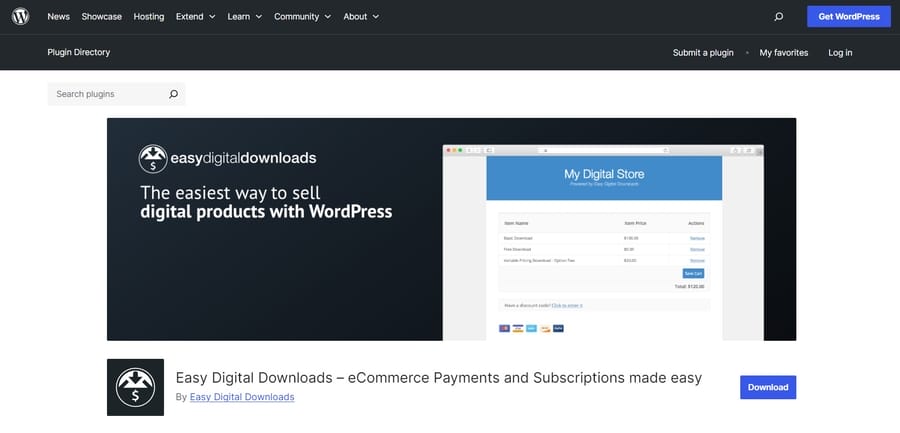
While WooCommerce shows a preference for physical product catalogs, Easy Digital Downloads takes the digital route by selling e-books, music, subscriptions, software and other online content.
Perhaps the biggest selling point of this plugin is its no-code setup process, with a step-by-step wizard to help you get your store up and running.
You can get EDD’s core features for free — you can sell license-free products like e-books with custom discount codes, product and file access management, recent activity tracking and reports.
However, the plugin’s paid features give you an all-access pass with site licenses, advanced customer support, affiliate marketing and in-depth analytics.
3. Ecwid eCommerce Shopping Cart
Capterra Rating: 4.6/5
Best for: Simple and flexible eCommerce integrations
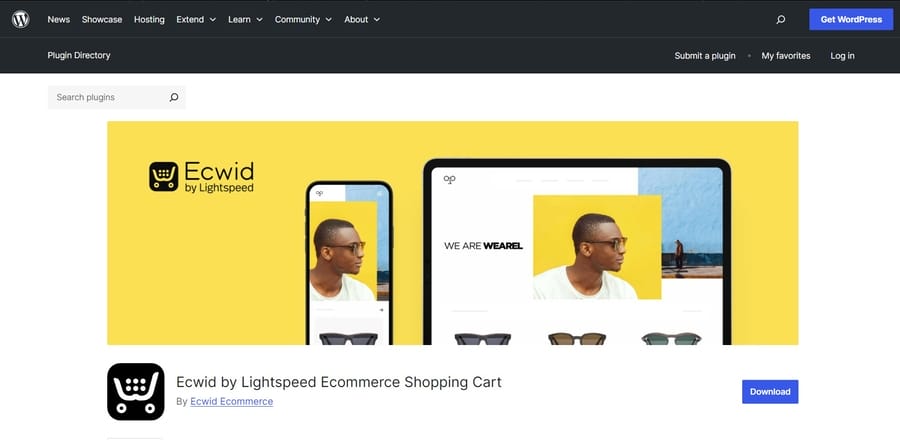
Selling products across multiple channels is a breeze with Ecwid since it integrates with social media platforms like Facebook, Instagram and TikTok, as well as other websites and applications.
The plugin’s cloud-based interface stores all your data on Ecwid’s servers, allowing you to access that information across all devices and enabling automatic backups and synchronizations.
Plus, the plugin page looks almost identical to the WordPress admin section, so newcomers will have no trouble navigating the backend and can experience the convenience of managing their store from the WordPress platform directly.
The plugin not only provides a responsive design, relevant micro-interactions, and automatic backups with most paid plans, but also offers a comprehensive list of features for small and large-scale operations.
4. Yoast SEO
Capterra Rating: 4.6/5
Best for: Increasing search engine visibility and recognition
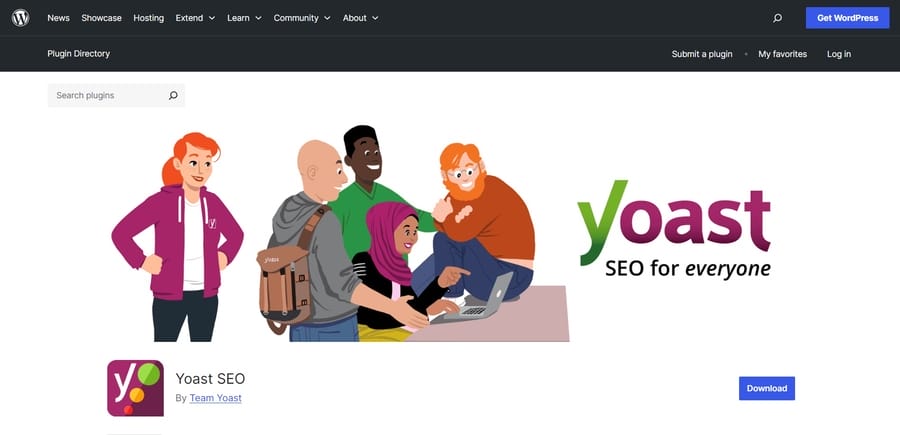
Improving your search engine ranking is the first step towards reaching a wider audience and boosting customer engagement.
Yoast SEO can help you optimize your content with relevant keywords and targeted meta descriptions to generate leads and increase sales through organic traffic.
The plugin also has a Premium version with even more functionalities — such as multiple keyword targeting, AI-generated suggestions, identifying broken links or orphaned content and page reviews on social media platforms.
While it doesn’t offer overtly eCommerce-specific features, Yoast SEO can help you turn passing visitors into recurring customers and help your brand thrive in the digital age.
5. BigCommerce
Capterra Reviews: 4.4/5
Best for: Enterprise content management systems
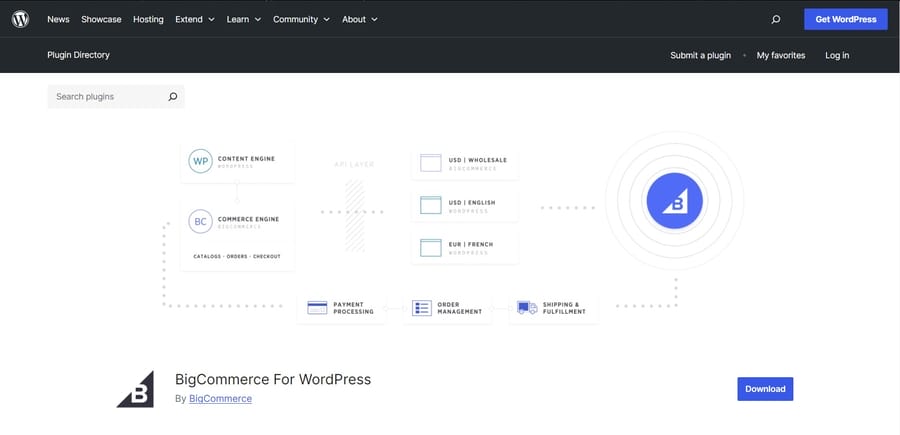
Despite being a fully hosted eCommerce platform, BigCommerce offers a signature WordPress plugin with a streamlined admin panel and a simplified dashboard for better user navigation.
It supports over 600 SKUs, so you can easily scale your business with BigCommerce’s advanced features like multi-currency support, 65 payment gateways, on-page optimization insights and real-time shipping quotes.
BigCommerce also supports Gutenberg blocks, allowing you to add product listings or call-to-action buttons without prior coding knowledge or experience.
Moreover, this plugin can help you tackle slow WordPress issues by running the site functionalities from the backend admin while all your content is effectively displayed on the front-end portion of your site.
6. EP EasyCart
Capterra rating: 4.8/5
Best for: Lightning-fast configuration and filterable reporting
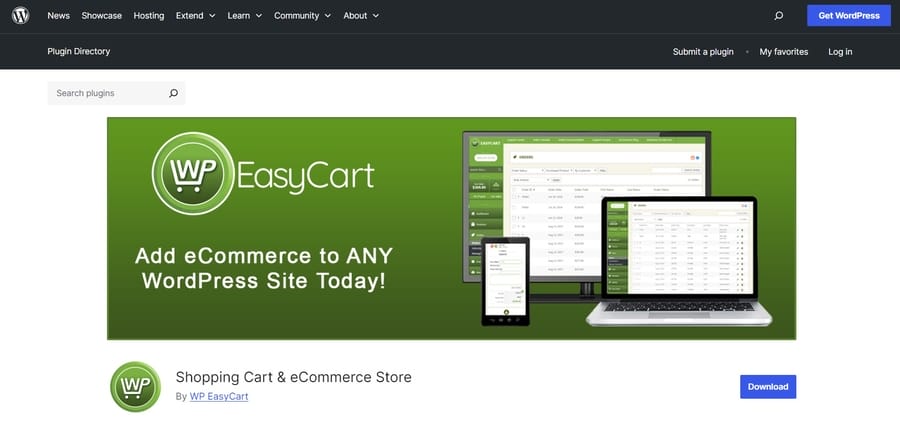
A versatile and straightforward option, EasyCart offers a no-frills content management system with a simplified admin panel and detailed product management.
It packs quite the punch for its competitive price — advanced marketing tools, comprehensive product catalogs, shipping details and abandoned carts overviews.
It also boasts caching compatibility to prevent cart caching issues and optimize the checkout page.
7. WP Simple Pay
Capterra ratings: 4.8/5
Best for: Efficient checkout process and secure payment processing
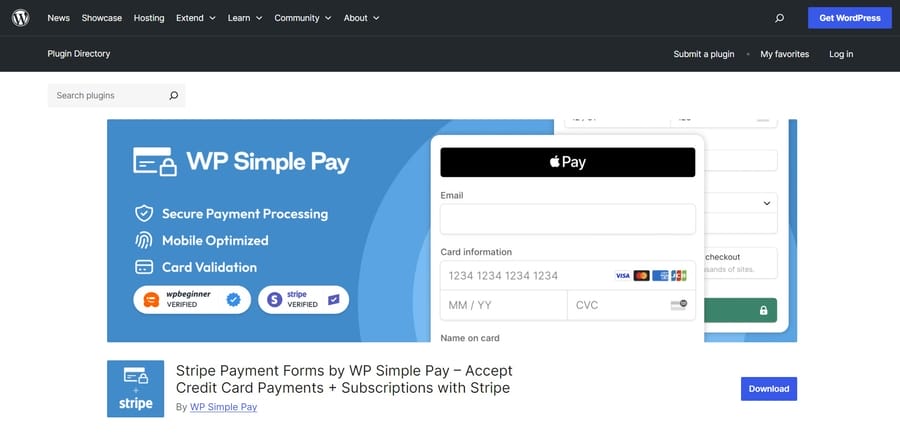
You don’t need to set up a separate shopping cart if you install the Simple Pay plugin — with a quick five-minute configuration, you’ll have a reliable and optimized payment gateway for all your orders.
You can use custom form templates or create your own with the drag-and-drop builder to collect customer information and process Stripe payments.
For repeat payments, you can set up recurrent forms to automatically charge cards on a defined schedule and view all your transactions in one place.
8. MonsterInsights
Capterra rating: 4.8/5
Best for: In-depth reporting and analytics features
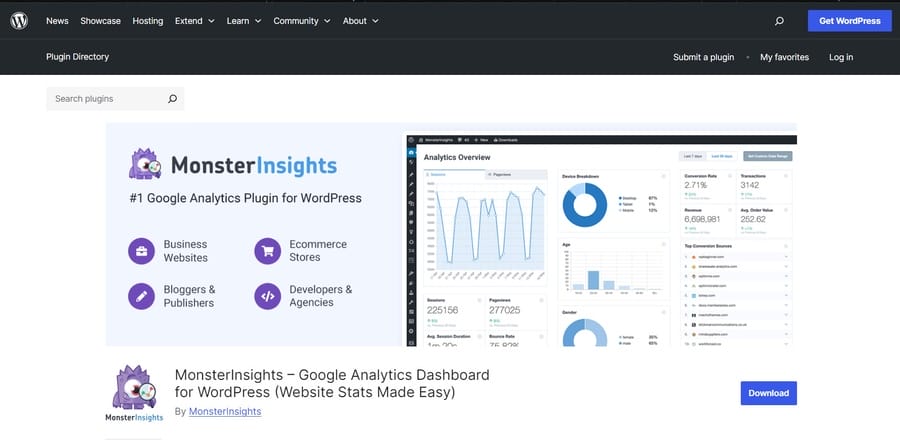
MonsterInsights lets you connect your eCommerce store to Google Analytics for a detailed overview of your organic traffic reports and website insights.
This offers convenient access to page views, revenue, bounce rates and conversion rates all from the admin panel, without logging into a separate Google account.
Plus, you can display your most popular and best-selling products with Gutenberg blocks, widgets and short codes to fully customize your online store.
9. MemberPress
Capterra rating: 4.8/5
Best for: Selling exclusive content for members or subscribers
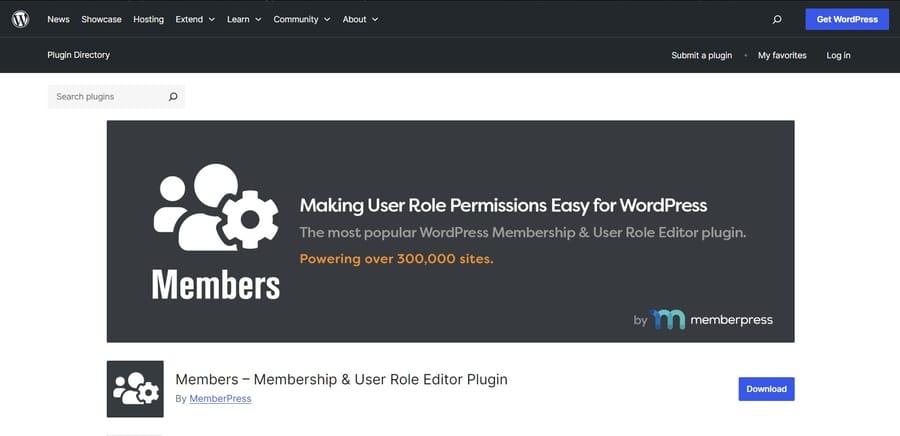
You can easily create membership sites or offer exclusive access to online courses with the MemberPress plugin.
It allows you to define access levels for different user groups based on their subscription plan or impose content restrictions during specific time frames.
Its automated reminders and email marketing strategies can send reminders for subscription renewals or upcoming membership expirations to keep your customers updated on their accounts.
10. SureCart
Capterra rating: n/a
Best for: Multiple payment processing options and high-traffic compatibility
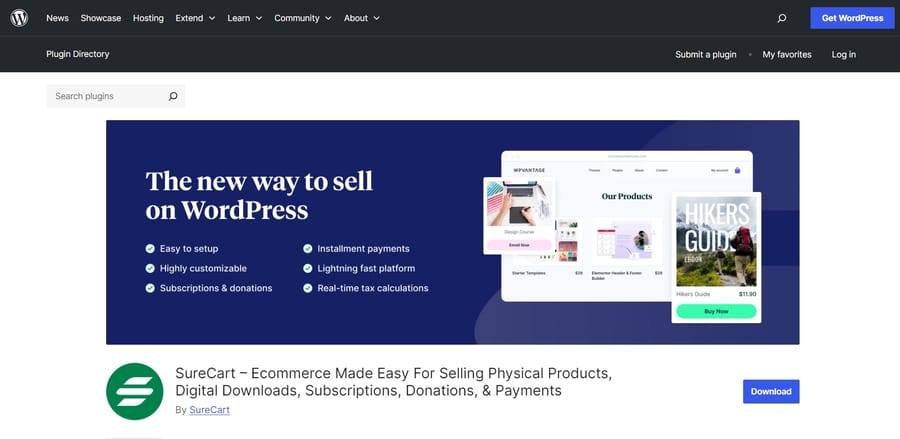
As far as backend responsiveness and ease of use go, SureCart nails its multi-payment and user-friendly interface while maintaining stable and reliable payment gateways.
You can use order bumps and one-click upsells to increase sales, and set up subscription plans for digital products with recurring billing.
The real-time tax calculations and VAT support offer a convenient and practical solution for users who want a comprehensive digital shopping experience.
Key Features To Look For In eCommerce Plugins For WordPress
Starting an eCommerce business is challenging, especially in a competitive market.
Integrating appropriate plugins to manage backend operations and streamline website navigation can help expand your audience and boost brand recognition.
You can easily navigate the sea of available options if you know which plugin aspects to prioritize:
- Security features: Make sure developers clearly outline the security measures they use when building their plugins and specify the standards they adhere to. This can include data encryption, secure payment gateways and protection against malware and other cyber threats.
- Regular updates and improvements: Prioritize plugins that receive consistent updates and improvements to ensure seamless functionality and minimize technical glitches. You can usually find update histories in reviews or the plugin’s documentation.
- Proven track record: Opt for plugins developed by skilled professionals to ensure all features work well without compromising the overall performance of your website. This helps avoid most pitfalls and shortcomings since experienced developers know how to mitigate these risks.
- Ease of implementation: Look for screen recordings, screenshots or detailed documentation to understand the user interface and admin panel. This will make implementation faster and help you get the most out of the plugin’s features.
- Compatibility: Always check if the plugin you’re considering is compatible with your version of WordPress and WooCommerce. In a constantly evolving technological landscape, outdated or incompatible software can cause errors and security vulnerabilities.
How To Ensure Cross-Browser Compatibility: Best Practices
Different browsers can interpret the same code differently or display the same content in various ways, so you should prioritize cross-browser and cross-platform compatibility for your plugins.
You can implement several effective strategies to ensure your plugins work seamlessly across platforms and devices:
- Adopt a mobile-first strategy: It’s easier to scale designs up rather than down. Desktop and tablet layouts are usually more complex as they offer more space and flexibility. Since 77% of global traffic share happens through smartphones, it’s better to focus on optimizing your mobile experience before moving on to bigger screens.
- Use flexible layouts and media queries: This includes using percentage-based widths and relative units like em or rem in your CSS code. This way, you can target a wide range of screen sizes and resolutions and streamline your online presence.
- Test on multiple devices and browsers: You can easily assess performance or compatibility by trying your eCommerce site first-hand on various devices. Or better yet, use tools like BrowserStack to automate and quickly identify potential issues.
- Scale or replace images with code: Consider the size and resolution of your images, as they can significantly impact website loading time. Since 70% of consumers note that page speed impacts purchasing decisions, you need to focus on optimizing your content. Instead of using large high-resolution formats, consider using code to create visually appealing graphics based on desktop, tablet or mobile layouts without impacting performance.
- Ensure browser-website compatibility: Use the latest web standards and best practices to ensure your site is compatible with modern browsers and technology. Outdated or unsupported features can negatively impact the user experience and drive customers away from your website.
Potential Challenges When Integrating WordPress Plugins
With the widespread use of plugins comes a greater number of challenges users might come across when installing a new plugin into their existing WordPress site:
- Breaks in layout and site errors: You should always test plugins in a staging environment before being added to live production sites. It’s best to source plugins directly from the WordPress Plugin repository or WooCommerce website, as they undergo various checks to ensure compatibility. Otherwise, broken layouts and site errors can negatively impact your site’s credibility and overall user experience.
- Conflicts: Even if a plugin is compatible with WordPress, it might not work well with your theme or other integrations. Always test them thoroughly and reach out to plugin authors for support if needed.
- Security: Always use plugins from reputable brands with a strong online presence. Be sure to read reviews and confirm that the developers regularly update their products. A whopping 90% of WordPress vulnerabilities come from plugins alone, so you can’t be too cautious when choosing and installing them.
Streamline Your WordPress Plugins With Digital Silk
Deciding on the appropriate WordPress eCommerce plugins with free and paid features is only the first step towards setting up and optimizing your online store.
How well you integrate these plugins with the rest of your website functionalities determines the overall user experience and can ultimately affect your site’s credibility and sales.
At Digital Silk, we understand the ins and outs of custom WordPress solutions and our expert team of developers, designers and digital strategists can help curate your online presence.
Our services include but aren’t limited to:
- eCommerce web design and development
- Custom web development and design
- Digital branding and marketing
- Magento and Shopify development
For each project in our portfolio, we offer:
- Full project ownership
- Transparent communication
- Measurable results
Have an eCommerce project?
Contact our team, call us at (800) 206-9413 or fill in the Request a Quote form below to schedule a consultation.
"*" indicates required fields


